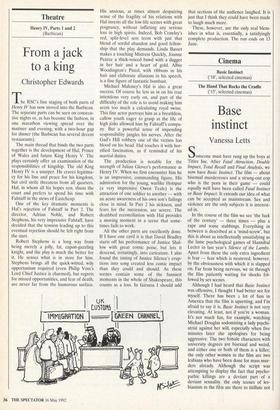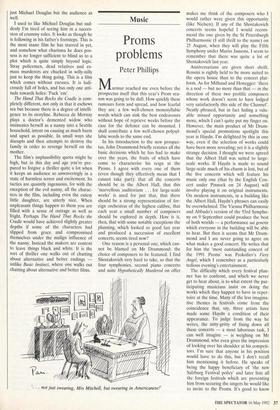Cinema
Basic Instinct ('18', selected cinemas)
Base instinct
Vanessa Letts
Someone must have rung up the boys at Titles Inc. After Fatal Attraction, Double Impact, Total Recall and Final Analysis, we now have Basic Instinct. The film — about bisexual murderesses and a strung-out cop who is the porn in their game — could equally well have been called Fatal Instinct or Basic Impact. It extends our idea of what can be accepted as mainstream. Sex and violence are the only subjects it is interest- ed in.
In the course of the film we see 'the fuck of the century' — three times — plus a rape and some stabbings. Everything in between is described as a `mind-screw', but this is about as intellectually unsatisfying as the lame psychological games of Hannibal Lecter in last year's Silence of the Lambs. Apart from these the only extra ingredient is fear — fear which is neutered, however, by the obviousness with which it is slapped on. Far from being nervous, we sit through the film patiently waiting for shocks fol- lowed by sex scenes.
Although I had heard that Basic Instinct was offensive, I thought I had better see for myself. There has been a lot of fuss in America that the film is upsetting, and I'm afraid to say it is. Basic Instinct is not very elevating. At least, not if you're a woman. It's not much fun, for example, watching Michael Douglas sodomising a lady psychi- atrist against her will, especially when five minutes later she apologises for being aggressive. The two female characters with university degrees are bisexual and weird, and either one or both of them is a killer; the only other women in the film are two lesbians who have been done for mass mur- ders already. Although the script was attempting to display the fact that psycho- pathic killings are a deviant part of a deviant sexuality, the only scenes of les- bianism in the film are there to titillate not
just Michael Douglas but the audience as well.
I used to like Michael Douglas but sud- denly I'm tired of seeing him in a succes- sion of crummy roles. It looks as though he is following in his father's footsteps. This is the most inane film he has starred in yet, and somehow what charisma he does pos- sess is no longer sufficient to blind us to a plot which is quite simply beyond logic.
Stray policemen, dead relatives and ex- mass murderers are chucked in willy-nilly just to keep the thing going. This is a film which comes without excuses. It is ludi- crously full of holes, and has only one atti- tude towards holes: 'Fuck 'em'.
The Hand That Rocks the Cradle is com- pletely different, not only in that it eschews
sex but because there is a degree of intelli- gence to its storyline. Rebecca de Mornay plays a doctor's demented widow who insinuates herself as a nanny into a Seattle household, intent on causing as much harm and upset as possible. In small ways she disrupts and then attempts to destroy the family in order to revenge herself on the mother.
The film's implausibility quota might be high, but in this day and age you're pre- pared to forgive a thriller quite a lot when it keeps an audience so unwaveringly in a state of harmless terror and excitement. Its tactics are quaintly ingenuous, for with the exception of the evil nanny, all the charac- ters in the film, including even the cutesy little daughter, are utterly nice. When unpleasant things happen to them you are filled with a sense of outrage as well as fright. Perhaps The Hand That Rocks the Cradle would have achieved slightly greater depths if some of the characters had slipped from grace and compromised themselves under the malign influence of the nanny. Instead the makers are content to leave things black and white. It is the sort of thriller one walks out of chatting about alternative and better endings — unlike Basic Instinct, where one walks out chatting about alternative and better films.



















































 Previous page
Previous page